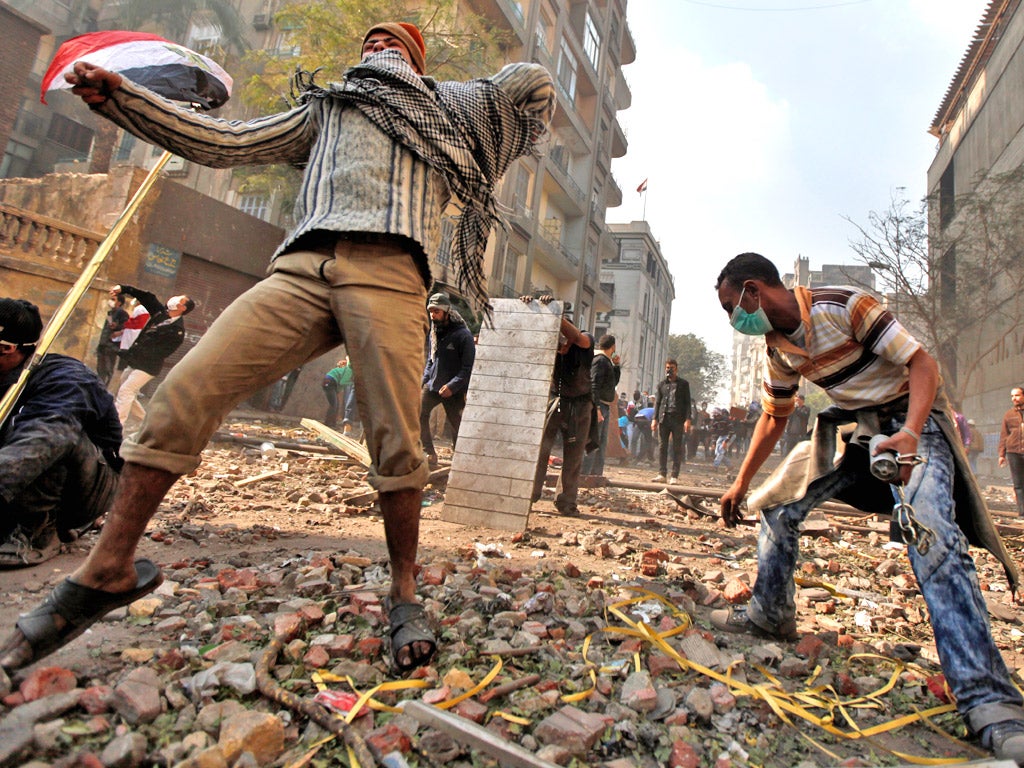Egypt toll rises as protesters reject pledges of military
The generals say elections will go ahead on Monday but serious clashes have spread to other cities

Your support helps us to tell the story
From reproductive rights to climate change to Big Tech, The Independent is on the ground when the story is developing. Whether it's investigating the financials of Elon Musk's pro-Trump PAC or producing our latest documentary, 'The A Word', which shines a light on the American women fighting for reproductive rights, we know how important it is to parse out the facts from the messaging.
At such a critical moment in US history, we need reporters on the ground. Your donation allows us to keep sending journalists to speak to both sides of the story.
The Independent is trusted by Americans across the entire political spectrum. And unlike many other quality news outlets, we choose not to lock Americans out of our reporting and analysis with paywalls. We believe quality journalism should be available to everyone, paid for by those who can afford it.
Your support makes all the difference.The death toll continued to rise across Egypt yesterday as protesters rejected political concessions from the Military Council and a wave of bloody street violence convulsed the country.
Volunteers in Cairo scrambled to deliver medical supplies to a constant stream of injured protesters, using Twitter to co-ordinate the flow of antibiotics and surgical equipment to the various field hospitals around Tahrir Square.
Egypt's ruling generals, who took power following the fall of Hosni Mubarak in February, were also facing growing international pressure last night. The UN condemned the government's handling of the demonstrations, while Germany called for a quick transfer of power to civilian rule.
Despite the ongoing crisis, which one rights groups said had now claimed 38 lives, a close confidante of the Military Council told The Independent that elections scheduled for Monday will definitely go ahead. "The elections will happen on time," said former general Sameh Seif Al-Yazal, who is in daily contact with members of the council.
Protesters have rejected a series of concessions from Field Marshall Hussein Tantawi, who on Tuesday made a televised address promising a presidential election by July. Previous statements from the military suggested the poll could take place as late as 2013.
The echo of gunshots continued to reverberate around central Cairo's ruined streets yesterday. Activists hiding in the shattered shell of one cafe ran spluttering into an adjoining bathroom after police tried to smoke them out with a tear gas canister. Fifty yards away grey smoke billowed from the third floor of a burning apartment block, a short walk from the heavily guarded Interior Ministry. There were also serious clashes in other cities such as Alexandria and Assiut.
Demonstrators have said they want an immediate transfer to civilian rule, ditching the Military Council in favour of an interim government. Field Marshall Tantawi has said his government will consider a referendum on the proposal, though some activists say this is just a ploy to foment division.
"They are repeating the old tactics of Hosni Mubarak, but with a twist," said Mohammad el-Gamma, a member of the liberal Al-Adl party. "They want the referendum so the Muslim Brotherhood will mobilise and go to the polls."
The Muslim Brotherhood, whose political wing is widely expected to be the biggest winner in the coming parliamentary elections, has not endorsed the recent protests. A pan-political interim government could upset its plans.
Egypt's generals now have their backs against the wall. If they cede to the demands of the demonstrators they face being thrust to the political margins; but by continuing to dig their heels in they are risking the wrath of the street.
Join our commenting forum
Join thought-provoking conversations, follow other Independent readers and see their replies
Comments